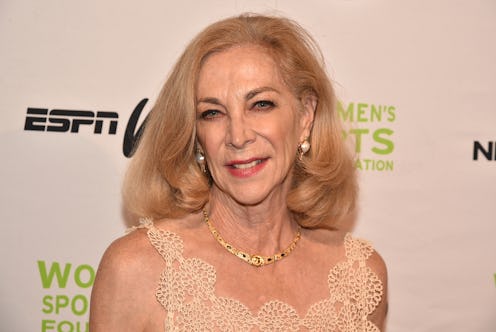
In 1967, a 20-year-old Syracuse University journalism student named Kathrine Switzer made history as the first woman to officially enter the Boston Marathon. On Monday, 50 years later, Switzer will run the marathon again. She will wear the same number she wore back in 1967, 261 — a number that is particularly significant because a race official tried to rip it from her clothing.
Switzer is now 70 years old, and has run 39 marathons during her career, according to CNN. However, Monday's race will be Switzer's first marathon since 2011, as well as her first time participating in the Boston Marathon since 1976. In the years since she first ran the marathon in 1967, Switzer has played an important role in paving the road to gender equality in sports — though, as she has pointed out, a woman named Roberta Bingay Gibb ran the Boston Marathon a year before her, just without an official bib. In 1967, Gibb was running the race for the second time.
But what happened to Switzer in 1967 became a defining moment for women in sports. She had entered the Boston Marathon officially using her initials, K.V. Switzer, and paid the $2 entry fee to obtain a bib. Ever before the race, her coach on the Syracuse men's cross-country team expressed skepticism about "fragile women" being able to complete a marathon. However, after she proved that she could run more than the required 26.2 miles in practice, her coach took her to Boston himself.
Then, during the race, race director Jock Semple lost his temper and tried to rip her bib off her. But in what has since become an iconic moment, Switzer did not let him get to her.
"I made the decision at that moment to finish the race, which was a very hard decision to make," she told Newsweek. "I knew that if I didn't finish the race, nobody would believe that women could do it or should be there, and if I didn't finish, it would set women back, so I had to finish."
Switzer did more than prove that women "could do it." She and Gibb helped make room for other women to join them. Indeed, this year at the Boston Marathon, Switzer will be joined by roughly 13,700 women making up almost half of all runners in the race — and Gibb will serve as the race's grand marshal.
A lot has happened since Switzer first ran the Boston Marathon in 1967. During her career, Switzer has won the New York Marathon, created the Avon International Running Circuit of women-only races in 27 countries, and launched a nonprofit running club for women called 261 Fearless.
On the world stage, Switzer used data from the Avon Circuit races to convince the International Olympic Committee to adopt the first women's Olympic marathon in 1984. Switzer then served as an Emmy-award winning TV sports commentator before returning to marathons. In 2011, Switzer was inducted into the National Women's Hall of Fame.
Discrimination against women in sports has obviously not vanished, but Switzer, Gibb, and other women who have been working to create more opportunities for women in sports have certainly helped make significant progress.
From the moment Switzer encountered resistance during the 1967 Boston Marathon, she knew something had shifted that day.
“It was a life changing incident. Everything changed,” Switzer recently told WBZ-TV. “I said, ‘This is going to change my life, maybe going to change women’s sports and change the world.'”
As the Boston Marathon retires the number 261 in Switzer's honor, she can finish the race knowing that she was right: Everything has changed.